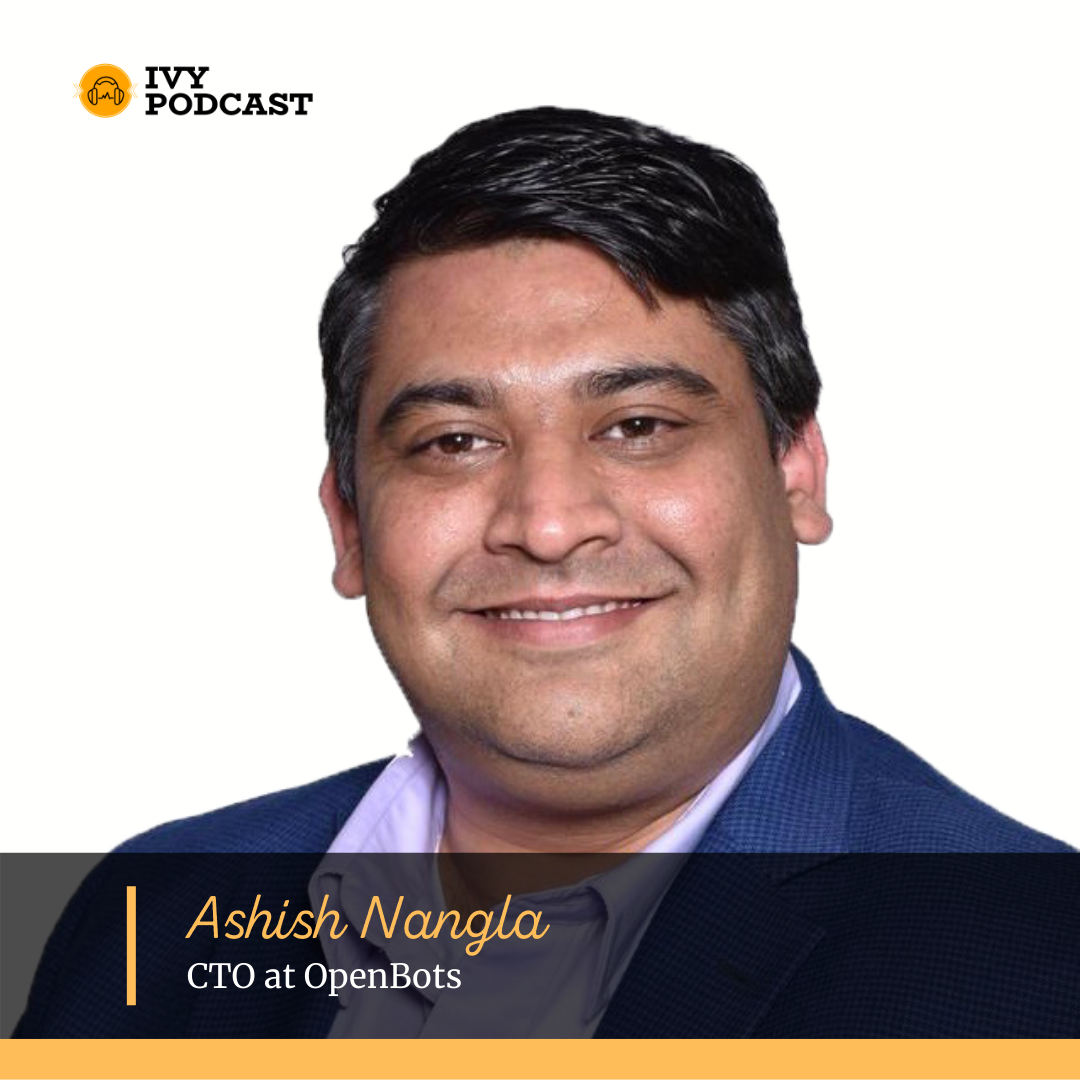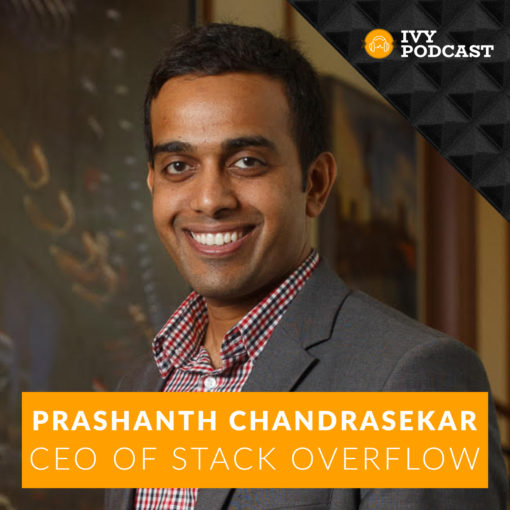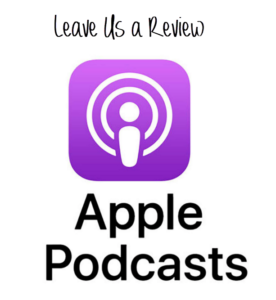
Ashish Nangla, the CTO of OpenBots, comes from an extensive IT and automation background and is a renowned subject matter expert in User Experience, AI, ML, RPA, and similar topics. Nangla believes that the RPA market was a natural fit for an open source model since, unlike other enterprise software, most commercial RPA software requires extensive implementation, maintenance, and support services on top of license costs. “OpenBots is our attempt to fulfill a promise,” said Nangla. “We want everyone to be able to create enterprise-grade simple to complex automations, very quickly, with little effort, and at very little cost. Our slogan ‘Open Source Automation for All’ explains our initiative very clearly. We want the democratization of automation and the widespread availability of the tools.”
Episode transcription:
[00:00:00] Ashish Nangla: [00:00:00] Now that we are willing to our cycles of sales and implementations. I am surprised that most of our clients are actually large companies, that they have billion dollar corporations with all their tools. And then I asked myself after these zoom calls about you're a billion dollar company, why are you talking to me? And then it looks like they also struggled with the same. The way calculations, when they open up the Excel sheet and they put in the license fee, the number of rules that qualify or come in agreements are very, very few. And they themselves are also looking at open source. [00:00:45] Thank you for listening to Ivy podcast, where we feature weekly leadership conversations. With thought leaders and industry experts. Now here's your host Courtney Domingas [00:01:06] [00:01:00] Cortney Dominguez: [00:01:06] Ashish. Welcome to the Ivy Podcast. Thank you so much for having this conversation with me today. [00:01:11] Ashish Nangla: [00:01:11] Thank you so much for having me over. [00:01:13] Cortney Dominguez: [00:01:13] Can you please tell everybody a little bit about your background and also about Open Boxing? [00:01:17] Ashish Nangla: [00:01:17] Sure I am sheesh and I left. I am the CTO and co-founder for open boxing. Open Box is essentially an RPO open source RPA tool. It's now available in the market. We have launched in about November, early November. Myself, I've been in ID services, Nike consulting for a long, long time, about 45 years now. Did gigs for large insurance companies, financial services, banks, high level architecture in terms of creating solutions as well as did a lot of in the later years I started doing a lot of emerging tech, especially around EIS, RPA, IoT a whole bunch of new technologies that started breaking ground and look very promising. They're kind of starting to become mainstream now. RPA was definitely one of them. RPA was the early contender and looked like it had better ROI for most of the other results and more definite business cases and use cases for us when we started implementing RPA and earlier we did have to explain what RPA was and things, but at the end, RPA took off very well. It was understood by the business community better. And they started appreciating what RPA can do. And I thought this could become a business by itself and not just part of some services that, an independent thing altogether. [00:02:53] Cortney Dominguez: [00:02:53] So you and I are passionate about RPA, and we deal with it every day. According to Gartner Global RPA revenue is projected to reach $1.8,-1,9 million this year in 2021. And that's an increase of almost 20% over 2020. And the growth rate is expected to continue by double digits into 2024, despite this, and despite you and I living and breathing this every day, there are still companies out there that are exploring this technology and haven't really leveraged it yet. So maybe can you describe RPA and also some of the benefits it can bring to an organization. [00:03:32] Ashish Nangla: [00:03:32] Absolutely. I mean, RPA, when we describe RPA or another, when we started this business, how I described this to my RP, to my wife was RPA, is what, I think my wife wants it to be, it has to be simple. It has to be fast to implement. You cannot be coding the same thing again and again, and it is a few days ago or like, when we started open and slightly, a few days before that she saw me coding and said, you are doing the same thing that you were doing 20 years ago. These brackets are, these semi-colons look the same. And I actually agreed with her that technology has not improved substantially to make things better. And RPA is exactly that, right? RPA is the answer to that. People may look at it from different views. They can, they think of it as tactical. Somebody can think of it as a strategy, but that is essentially what we set out to be what I call as the unfulfilled promise of it. We were supposed to do things really fast and turn it out, applications and make business better. And RPA is going to do that. RPA is making that change by making sure that all the human effort goes into operating a business can get automated, right? Can be so anything that needs to be moved around on applications, data being entered, data being extracted. So these are not only the data work, I want you to say that some time ago that it's just repetitive work, but that's not true anymore. So in business processes, trying to get more automated and involve hans in the loop when only a decision needs to be made or an important information needs to be conveyed, something needs to be reviewed, make sure you have not missed out, put the decimal in the wrong place, in a check amount and those kinds of things. So that's where they come in. RPA earlier was started as a fringe thing out and through elements of an organization tried to right overcomplicated macros but that's not true anymore. There is a good venture of its tools that have come up and everybody has started embracing that now. So we see RPA adoption, there is hardly any CFO anymore who does not know what RPA is, there might be CIO that don't know what it is, but I'm definitely sure CFOs know what that is. And it's essentially making sure they are able to do that because it's being talked about and how they're able to improve costs and operating costs and make making that mainstream. [00:06:15] Cortney Dominguez: [00:06:15] Yeah. And that's an excellent point. I think a very typical place to start an RPA project is within the finance organization, finance and accounting, because so much of what they do is like you said, repetitive, but also very manual. It's very labor intensive and very manual and gone are the days of those six months, two year long implementations, RPA is so much faster to implement. [00:06:42] Ashish Nangla: [00:06:42] That's right. That's right. I mean, those times then I remember I have implemented an RPA one single process in nine months. I mean that, it was that crazy, like getting the part where you're located explaining 500 people, what you're doing and stuff now it's become. People have, are now a van, what it is they have would be the basic understanding of the infrastructure, people are booming processes at a much higher rate. So that's actually a good thing. And I think that's exactly why we thought it was the right time to bring in something like open box. [00:07:18] Cortney Dominguez: [00:07:18] Yeah. So let's talk about that. So Gartner peer insights lists 20 plus RPA software vendors right on the market. We're seeing a trend by enterprise software companies, incorporating intelligent automation of the products. Microsoft is getting big into this space now. So why did you decide this was the right time to go to market with open bots and what really differentiates your software from others that are already on the market? [00:07:41] Ashish Nangla: [00:07:41] So, when we started with Open Box, we talked about not being able to implement these services really easily. And this was a good business model that we go without implementing RPA for large companies that, by the hundreds, at least that's sort of, we eat it dream tough. And once we were early, we were doing only high ROI processes, so it looked like this will never end and this can go on and we'll keep making money and this company will become huge just by doing that. But the first thing we saw that there is a clear lack of understanding of how the ROI works, right. If you see all the projects that we do, they are still the top a small percentage of what processes can be automated. Everybody struggles with getting the right ROI and, even though the commercial tools have done an amazing job in marketing and creating the awareness. If I’m into a large organization now, there is already a head of automation or head of RPA, there's already two people who know how one of the tools, any one of the tools work and things. So they have done that as a good thing. But on the other side, the real disservices, the licensing models, the minute we put in the license numbers of a whole bunch of use cases, suddenly don't qualify or do not show up on the radar and without how do we fix this? And especially being at that time, a startup, we did not know how to make money off that, right? So we saw open source options and there were some options that we thought were very good. Some options that were horrible. Some of them were just abandoned. We looked at all of them and realized there is not even a single good contender at that point of time that could actually take up the call, some of the commercial stuff or the features. So either they did not have the features or they did not have the right support models and those kinds of things. And we decided, we looked at that and said, we will start using Python and it was not going anywhere either, right? Like you did not, we couldn't orchestrate, we couldn't do unattended stuff very well, we could schedule it somehow and stuff, but those were not real solutions. If you, anybody who worked with the commercial RPA tools could come in and call it bullshit. Right? This is not how, if not, how RBS should be. It was the opposite of programming. And now we've gone back to programming. So we thought we should write something ourselves. We looked at the open source market or models altogether. And we found it very interesting. And with the advent of cloud and other things that have come up AI and cloud and other things and be taught. Why not have a nice open source application which can do all the RPA stuff, what people really want. We would not have to interfere with the day-to-day Ottawa of people and when people want to move to the cloud or when people want to do AI, when they want to do document understanding and document processing, that's when they could come to us and we can make money out of that. We could definitely make money out of hosting services, like the WordPress model, the application is free, but when you're more hosted, that's when you start paying or similar to MongoDB and other things. So we decided we were going to be the red hat of RPA. That's that's essentially the thought behind it. That's the strategy that looks well. We got funded for it, we are absolutely, our investors are very excited in terms of where this is actually headed. And it started with smaller tools and smaller use cases. And we were always thinking that we would go with small and medium enterprises. They are the ones who can't make sense, but actually now that we are willing to our cycles of sales and implementations, I am surprised that most of our clients are actually large companies, that they have billion dollar corporations with all their tools. And then I asked myself after these, because you're a billion dollar company. Why are you talking to me? And then it looks like they also struggled with the same, do calculations like this, when they open up the Excel sheet and they put in the license fee the number of rules that can qualify or come in green is very few. And they themselves are also looking at open source. So, we now think that we have hit the right cord, with the market where there is a need for an option where they can actually improve the number of use cases they can bring to that, to the business. They can improve technology drastically without compromising on capability. [00:13:03] Cortney Dominguez: [00:13:03] So it sounds like one of the main benefits between an open source technology versus a commercial RPA tool is. But certainly ROI, right? I mean, you have more use cases that fit in because of the lower cost. And because you don't have some of the same licensing costs. Like you do a commercial RPA tool, but what about the support of it? I mean, is the support of it also easier because it is an open source product. [00:13:30] Ashish Nangla: [00:13:30] It is easier. I've been, we can drop rough patches and we can do BRS and modular requests, more often than what some of our commercial partners could do or commercial commutators could do. We definitely think that the support model is now so much better because it's not only the RPA people who are now being able to communicate with each other and talk about it. We have people who are building commands for us just out of date needs that are now in the conversation. We now have people who want to build features like somebody didn't like one of the features we had in the recorder. So they kind of went ahead and changed it and then later had a call and now we have that feature in the tool itself. So a lot of this is coming out of the true open source and assessment. So it's way beyond, yes, we are lower in numbers right now in number of people who have adopted and number of people who use it. But the sheer variety of people is going to be much higher. So if we get the same time to mature, like some of the other tools. The number of people who understand our to in and out would be way higher. Supportability makes it easier because Hey, if, if you don't know why something is not working, you don't have to wait until a support ticket is opened and somebody answers it. And those kinds of things, you can just go to GitHub and look at how we developed it and say, Ah, this is how it works and you could change it right. On the other side, we did the thing that not having commercial support or the proper professional support would be an impediment for a lot of organizations to implement this. Especially if you're small, you don't know how to install servers, you don't know how to install some of these things. So we did come up with a plan. We tried to make sure that it is as low as possible. So we have a standard plan and a priority plan. Not for priority for somebody who wants to use this for mission critical things and immediate, we have response times at highest valleys and standard would be for people who want to make sure that this stuff doesn't feel like I downloaded it off the internet. Would it work? Those kinds of questions. So, that's why we did land up creating a support plan. [00:15:47] Cortney Dominguez: [00:15:47] Sure. And I think that makes a lot of sense. I mean, there are companies that are gonna have the people that are able to do it in house. And then there's the other companies that like some of your target market, like you were saying is smaller in nature. So maybe they don't have that support team that they can do it in house. So then they're able to go back to your team to be able to provide that encompassing technology and support. [00:16:09] Ashish Nangla: [00:16:09] Same with large companies. Like we thought this was only for small companies and things, but that kind of changed very fast. When we are looking at large organizations and especially as a support plan is not based on the number of bots. So the calculation works out to be so much easier for them. They're not worried about how it's going to change in terms of how, when the scale, right? Like just yesterday I had a call with a prospect, a large financial services client and they, and the guy kept asking me. What's the catch? That is the open source model. And that is how these things operate. We don't want to make revenue off of each install and each individual process and part people installing part people use, we're looking at overall implementation. We want the market to grow and we would have a smaller chunk of business out of that. It's good enough for us. Like, it's either you have the whole cake or you have a much larger cake and have a larger piece of, I think our strategy is we want the industry to go. We want this, the adoption of RPA to increase and we are sure we will be able to have a bite, a piece of the cake for us as well. [00:17:32] Cortney Dominguez: [00:17:32] So for that company, like the financial services company, or other companies that are looking to start their RPA programs or expand them, and they're evaluating various RPA tools. What kind of advice do you give them, what would you say to those that are potentially looking at your tool and others? [00:17:51] Ashish Nangla: [00:17:51] I think, typically when we go through this evaluation, we have done this a few times now. We are glad that we were putting in the same Excel sheet as most of the commercial products now and given ratings. And that's how we see most of them comparing. And most of them evaluate the advice or the thought that I haven't when we do that, or we really hope that the evaluator looks beyond the marketing, right? So it looks beyond the B shiny objects. And even looking at these tools, it's also about. What you really need, right? How can you get your program off the ground? And how are you going to scale? These are questions that you need to really ask, if you're being provided with options to do a number of things, are you really going to use that? You have to ask that. Yes, it is nice to be future proof, but then you are forgetting the fact that it's going to cost you to get, go for, to do that. It's also harder to implement. It's also going to get difficult to manage and maintain, and it's not like RPA does not need maintenance and you have just put it on some machines and it's just running. You have to constantly manage it and monitor it. And be expats of 16, we did that. Like this is our daily life. [00:19:27] Cortney Dominguez: [00:19:27] So exactly, I think, cause I think you're right. I think a lot of people think RPA is set and forget its technology. And it's not like that, like any software, it requires maintenance and care and feeding in order to continue to make sure everything's working. Like it's supposed to be. [00:19:40] Ashish Nangla: [00:19:40] Exactly. And, yes, we people are able to start off with RPA programs by giving them top 10 business cases. But think beyond that a little bit, you have to see how it goes beyond that, how it's going to go,it's good to truly affect your organization and make that the business's case. I have seen the majority of the companies that take are only Ottawa based. Hey, if I put in $50,000 in automating this process and 50,000 in licenses, am I going to save $200,000, whatever. Right. So those are Excel sheets, but the true value of RPA will start coming in when people have more objectives or more business benefits out of RPA. I have seen insurance companies that are legacy insurance companies, but one to one or two use RPA to improve their business offering. So they started working with InsureTechs and the new fintechs, , and there were, there are businesses now possible that were not even possible before RPA. Yeah, right. So being able to process certain policies in insurance, certain contracts and financial services and other things were not even possible. If they were not automated with RPA, the way they were. Look at KPIs. So business capabilities need to be added on the other side, RPA tools. Businesses can offer RPA as part of their own integrations. Right? So if you were a large supply chain company, right, and you have customers and you have brokers and other people, you could offer them an RPA. Environment where they can automate and integrate with your systems. So it's not only that you're bringing in this value of automation for yourself and only doing your finances and Excel sheet automation, but you're actually being able to affect your business partners and overall improving what you're offering to your customers. So RP needs to now come into that as well. [00:21:46] Ashish Nangla: [00:21:46] Yeah, I love that. That’s exactly. And it's not only used as an automation tool, but it's also a business collaboration tool. [00:21:55] Cortney Dominguez: [00:21:55] Yeah. I think some of the most interesting use cases for RPA are where you're thinking outside your traditional spaces and you're beginning to leverage it and more creative ways. And even in some cases, Bots, a bot technology, it can be a customer vendor where you're interfacing back and forth. And you're really taking the manual human out of it at that point. And having bots about communication. I think there's a lot of interesting, interesting places where it can be leveraged. [00:22:22] Ashish Nangla: [00:22:22] Absolutely. It's just that once you move ahead of these basic use cases, the top 20 use cases that you have, that's when you start seeing these things, and that's when it takes you to this whole pricing model per bot. A license model is so broken and there's no way out like the deals that I see all the commercial RPA tools that have been made within investors, evaluating them at billions of dollars. Even though I envied that, but also the fact that kind of has made them sign the deal with the devil because now they cannot get out of it. There, they cannot come back to you and say, Hey, we got to give you more cost input, a cost improvement out of what they have. We cannot give you a per transaction model. We can't give you a par bot, or a process model or something like that. It has to be the broken model that we have today for Bart. And so it is going to be the biggest bottleneck that not only individual organizations, but the overall industry is going to see. That's the glass ceiling of this industry, I would say. [00:23:37] Cortney Dominguez: [00:23:37] And it sounds like you're here to disrupt [00:23:37] Ashish Nangla: [00:23:37] It’s ready for that. And I think that that is what we think we will change. Right. I mean, that's where we will make our Mark. We don't want, again, going back to the, by the strategy, we want the big industry to grow and us being able to have a piece of that. So, that's where we are headed. [00:23:57] Cortney Dominguez: [00:23:57] Yeah. So it sounds like that's where you see things headed from not only your perspective, but also RPA in general. And I think 2021, it sounds like it's going to be a big year for you. So, and open bots for sure. And source technology in general. So, any other trends, anything else you see kind of happening in the year ahead? [00:24:19] Ashish Nangla: [00:24:19] I think two trends that we see other than the open source RPA trend are very evident. The open-source trend is happening. We are now seeing people interested in that people, kind of supporting that there are people who are now. Starting to explore that, see very seriously. So that's a good trend. So 2021, definitely we will see that open source has become mainstream people understand that we are a windows that is also this Linux thing that can be used. So we see that the open-source RPA equivalent coming in the other two trends is definitely about moving to cloud. I think people have resisted the cloud for a long, long time now. And I don't think they have a choice anymore. With how people were, it was a clear differentiator for people in these pandemic times. Right. You saw people who had clouds. Whatever to do. People who did not have the cloud would not be able to do things right. So that trend would continue. People don't have a choice anymore. If they need to evaluate, they need to look at how cloud and RPA can work together. And that's, again, one of the drawbacks we see, but with commercial tools, most of them are not cloud ready. They're not even close. Some of them are trying to work towards it, but most of them just cannot work in that environment. It's a high failure environment. It's a more distributed environment. Those are environments that most of these clients are to be solutions that do not work. So that's the second trend. The third one, I would say, really would be a little bit of more machine learning and AI coming into play, which includes, I would say, document processing. So document processing definitely in 2021 will become mainstream. People realize that there is way too much paperwork that they generally in businesses for everything, they landed up creating a document or a form that has, that is coming back to haunt them. And they will see document understanding and machine learning and AI as some of the solutions out, because now you are able to do transactions without you can throw in calculations in between business processes. And plug them in that you will see AI kind of improving the use of AI improving. I would not think that a lot of people will suddenly start making deep neural networks and throwing them in business processes, but good statistical machine learning models will start coming in and try to show what our RPA can bring in. So, if a loan comes in, they will definitely be scored and classified before actually a human skin can actually prove it. And underwrite, if an insurance policy comes in or a claim comes in, they'll definitely be a fraud score that an RPA would calculate to come up with a commit with an indicator for the adjusters to look at. So those are things that definitely are 2021 Prince. I will be surprised and quite disappointed if they do not turn out to be correct. [00:27:43] Cortney Dominguez: [00:27:43] Well, I think what you said makes a lot of sense. I mean, we're certainly seeing a big shift to cloud technology, like you said, and more and more, more and more vendors are moving that way more customers are moving that way too. But like you said, the technology really needs to keep up. Right. And the software needs to keep up with moving to the cloud. So, and of course, my favorite thing about the past year has been the elimination of so much paper. [00:28:15] Ashish Nangla: [00:28:15] And I think, like you said, I think people add travel. [00:28:16] Cortney Dominguez: [00:28:16] That's true. Yes. That's true. True paper and travel. There's been a big reduction in both of those things this past year. So, I hope travel comes back. I'm less inclined to bring back paper. But I do think you're right. I think that people have realized how much paper they were using in two, how many forms and how many documents and all of these things that needed to be processed and processed quickly. We've really seen that, with health insurance and test results and reporting and all of that over the past year or so. I think you're right. I think we're only going to see that get even faster and more sophisticated over the course of the next year and beyond. [00:29:00] [00:29:00] Ashish Nangla: [00:29:00] That's right. That's right. And we think you and I will see really good things happening to our peers this year. [00:29:07] Cortney Dominguez: [00:29:07] I think so, too. So thank you. This has been a great conversation. Like I said, I know this is a passion of mine and a passion of yours and yeah. This has been a really fun conversation to have. And I think we're going to have to revisit it either later this year or next year, because big things are gonna happen over the course of next year and not just for our PA technology, but for open bots in yourself as well. [00:29:29] Ashish Nangla: [00:29:29] See how my predictions come through and if they do I move into astrology or something, [00:29:45] Cortney Dominguez: [00:29:45] I love it. Thank you so much for being on the Ivy podcast. [00:29:47] Ashish Nangla: [00:29:47] Thank you so much for having me all the best. [00:29:51] Cortney Dominguez: [00:29:51] Thank you. We really hope you've enjoyed this episode. Please take a moment to rate, subscribe, and leave a review on your preferred podcast listening platform. We really appreciate that effort until next time.
Welcome to Ivy Podcast! On this Executive Leadership Podcast we interview top executives from Fortune 500 with a focus on strategy, innovation, negotiation and everything about leadership.
Our Podcast for Executives features Thought Leaders who share practical insights for effective leadership, continuous innovation and strategy execution.
Ivy Podcast is a rapidly growing Executive Podcast, which covers topics like Hiring and Retention Strategies, Talent Acquisition, Innovation, Digital Transformation and much more.
On this Leadership Podcast, you will find conversations with the most accomplished executives from Fortune 100 companies. We aim to cover a broad range of industries and create a learning platform for the most ambitious and high potential professionals who are looking to learn from the most accomplished Executives on this Business Leadership Podcast.













